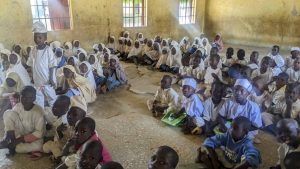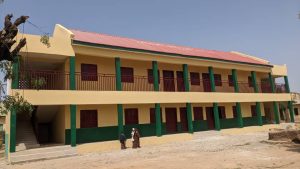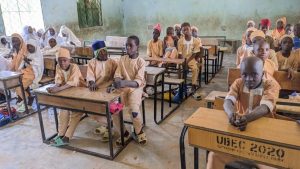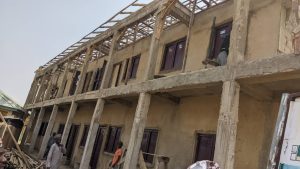From Mustapha Adamu, Kano
Worried about the deteriorated state of education in Kano state, Governor Abba Kabir Yusuf, since during his election campaign, promised to revamp the sector as one of his policy thrusts if elected as governor in the second most populous state in Nigeria.
In an apparent commitment to fulfill the promise, Governor Yusuf, in August, 2024, declared a state-of-emergency on education, aimed at reforming the sector for the overall development of the state.
This came before the governor allocated 29.1 percent on education in the 2024 budget, an unprecedented feat in the history of the state.
Similarly, the governor, during the 2025 appropriation bill presentation to the state’s House of Assembly recently, had announced allocation of 31 percentage to education, highlighting his commitment to revive the decayed education sector in the state.
Part of the fulfillment of the state-of-emergency policy, the state government had employed over 5,000 primary school teachers under the Better Education Service Delivery for All (BESDA), with a view to improve literacy and quality of teaching in the state.
Not long after the declaration of the state-of-emergency on education, the governor swung into action as construction and renovation works had sprung at many of the over 10,000 primary and junior secondary schools across the 44 Local Government areas of the state.
This is in addition to provision of the first phase of 78,000 three-seater desks, as well as hundred thousands of instructional and teaching materials distributed to the primary and junior secondary schools in the state.
Our correspondent reports that the government is currently reviewing the infrastructure at the schools that had been neglected by successive administrations, despite the intervention of international donors.
During a visit to some of the schools within Kano metropolis and outside to see the level of the implementation of the education policy, our correspondent observed that the projects are ongoing.
It was observed that while some schools are receiving reconstruction works, others have seen renovations of class rooms with some even being completed.
Our checks showed that at the schools visited in the three senatorial zones in the state, there are ongoing construction of four-class blocks, while renovation of some classes are ongoing concurrently, as some had even been completed.
At unguwar Jakada Primary School in Gwale Local Government, our correspondent observed that while a block of 4 classrooms with an office is under construction, renovation work had been completed on the other block of the same size.
The construction work at the primary school is at 50 percent completion, according to a supervisor of the project.
“The project is at about 50 percent completion as you can see. Work is ongoing from morning to evening.
“We are getting maximum cooperation from the government that is why the work is moving fast and smoothly,” he said.
At Abubakar Yusuf Government Junior Secondary School, Hotoron Kudu in Nasarawa Local Government area, another blocks of classes are under construction, but the renovation work is yet to commence.
At Darmanawa Gadar Karfe, our correspondent observed that a block of classrooms was under construction but at the foundation level.
However, the contractor and bricklayers were at the site doing the work.
Our checks were not limited to Kano Central alone as our correspondent had traveled to Kano North to see the level of the projects there and to find out whether the implementation of the policy was limited to the city only.
Starting with Bichi Local Government area, our reporter visited Sabon Layi Primary School where construction of one block of 4 classrooms and an office was completed, but yet to be opened for lessons.
Our reporter also observed that apart from the construction of the block, there was no renovation of classrooms at the school that has 1,764 pupils with 39 teachers.
At Dawakin Tofa Model Primary School, it was observed, a block of 4 classrooms and two offices is under construction with completion level at about 70 percent.
Sabiu Sunusi Idris, the Headmaster of the School applauded the Kano State Government for providing instructional materials and desks, a clear sign that the policy is being implemented.
It was observed that the model primary school have good toilets connected with solar-powered water system.
At Lambu Banki Primary School in Tofa Local Government and Zango 1 Primary School in Rimin Gado Local Government Area, the construction of blocks of four classrooms were ongoing and have reached at least 50 and 60% completion respectively.
Our correspondent proceeded to Kano South where he visited Garindau Central Primary School in Warawa Local Government, a school of 2,071 pupils being taught by 18 teachers only.
Apart from one block of four classes under construction, and some part of the school has gotten the share of the newly-procured desks, no renovation work going on there.
At Government Junior Secondary School Chula in Ajingi Local Government, our reporter observed that construction of a block of four classrooms and an office was ongoing, but at about 40 percent completion level.
The situation is similar at Gyanawa Primary School in Gaya Local Government area where a construction of a block of four classrooms was ongoing but at an early stage.
What needs to be done
Although there are good and commendable things in the implementation of the education policy in Kano state, there are numerous challenges that need to be addressed head-on if the government wants to achieve the set goal, especially in the are of infrastructure.
Our observation had shown that despite the distribution of thousands of desks, larger portion of the over 10,000 schools sit on bare floor.
At virtually all the schools visited by our correspondent, the pupils take lessons on bare floor, a situation that needs swift intervention to address the challenges of out-of-school children in the state.
Apart from lack of desks, another serious problem is derth of toilets. This is a problem that needs to be urgently addressed, especially as the state is battling to end the outbreak of diseases, especially cholera.
For instance, at Garindau Primary School, our correspondent observed that there are only four toilets at a facility with over 2,000 pupils.
A source at the school told our correspondent that the pupils had been allocated 2 toilets while the teachers are using two.
“Male teachers are using one toilet while female teachers use the other. We have allocated two toilets to our pupils, numbering about 2,071.
“We lack desks. As you can see, the pupils are taking lessons on bare floor. We are also having the challenges of flooding. Whenever rainy season set in, this school sometimes becomes inaccessible,” he said.
We also observed that even the teachers sit on bare floor at their staffroom, a situation that calls for urgent attention.
“Our major challenge in this school is shortage of furniture, because out of the 18 classes we have only three are furniture, the rest are empty as pupils sits on bare floor which is not conducive for learning,” said a teacher at the Sabon Layi Primary School in Bichi.
“Another major challenge is lack of toilets. In the whole of this school we have only four toilets which are in bad shape. We are calling on the state government to come to our aid and build more toilets for both students and staff ,also we need a befitting staff room for the teaching staff, “
Observation by our




correspondent showed that while the government is implementing the state-of-emergency policy on education, there are challenges that need to be squarely addressed to achieve successful implementation of the policy.






